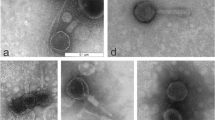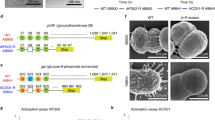Abstract.
FIZ15 bacteriophage, from a human clinical isolate of Pseudomonas aeruginosa, causes lysogenic conversion in the P. aeruginosa strain PAO1. The prophage-conferred phenotypes are: (1) increased resistance to phagocytosis by mouse peritoneal macrophages; (2) increased resistance to killing by normal human serum, and (3) increased adhesion to human buccal epithelial cells. These phenotypes are related to the prophage-induced change at the level of its own bacterial receptor, which appears to be the O-antigen.
Similar content being viewed by others
Author information
Authors and Affiliations
Additional information
Received: 31 August 1998 / Accepted: 20 November 1998
Rights and permissions
About this article
Cite this article
Vaca-Pacheco, S., Paniagua-Contreras, G., García-González, O. et al. The Clinically Isolated FIZ15 Bacteriophage Causes Lysogenic Conversion in Pseudomonas aeruginosa PAO1. Curr Microbiol 38, 239–243 (1999). https://doi.org/10.1007/PL00006794
Issue Date:
DOI: https://doi.org/10.1007/PL00006794




